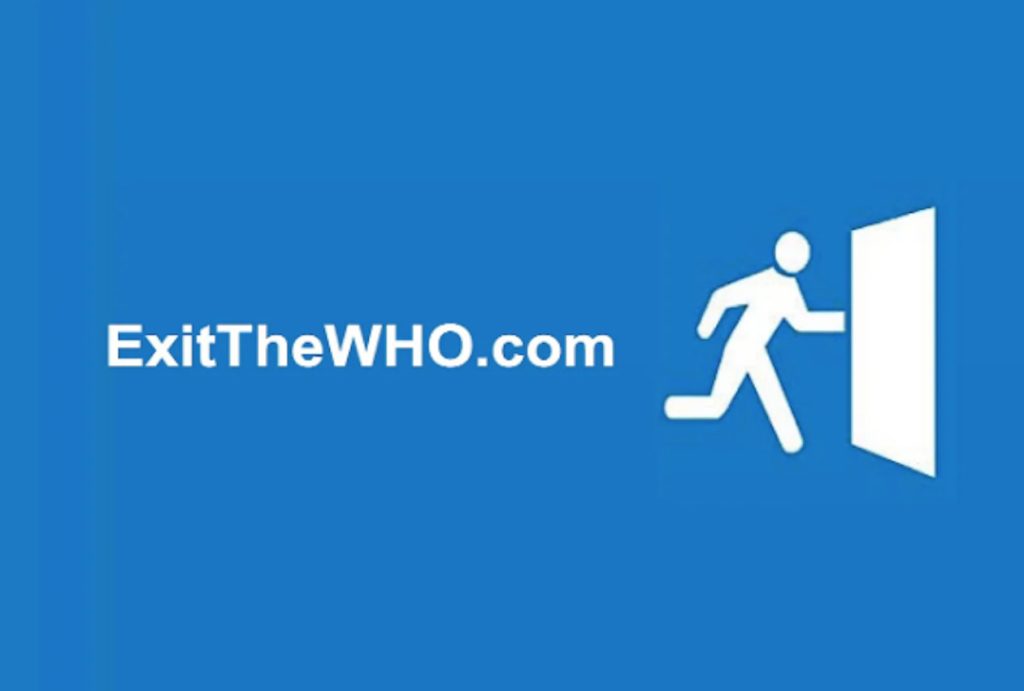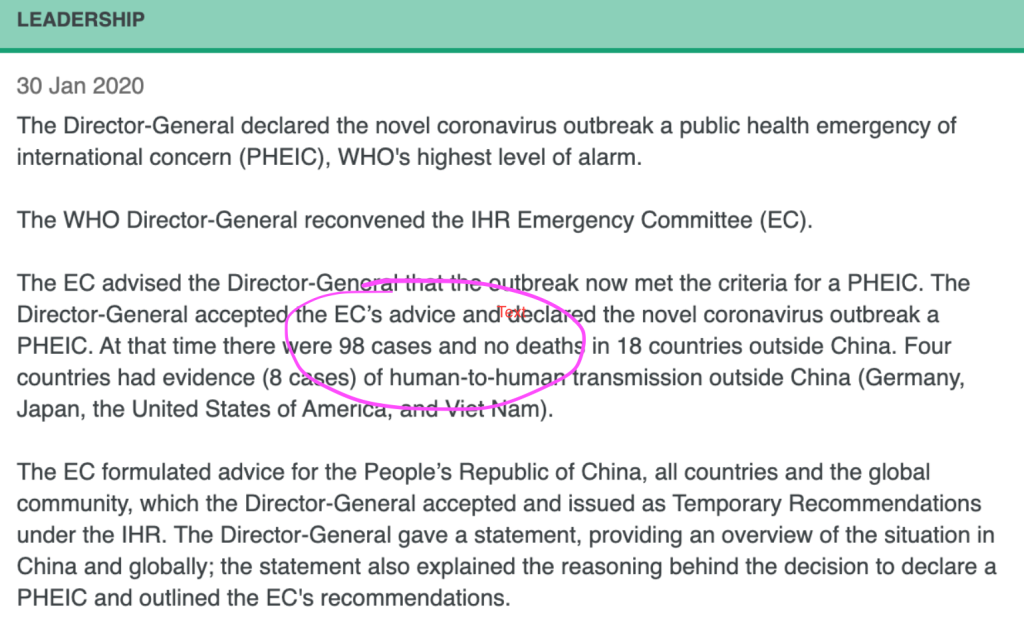If you thought the era of vaccine passes and limited international travel was over, think again.

The covid ere seems half-forgotten by many who were quick to move on and simply memory-hole the abuses of the policy response, which was particularly authoritarian here in New Zealand.
Since then, many have been out in the world traveling again – good for them, because it may not last long.
It’s looking increasingly likely that buying a plane ticket and heading overseas to visit family or friends, or holiday in some exotic location will get much harder generally in the next few years – but particularly if you’re the type of person unwilling to take every vaccination the government or global authorities tell you to.
This is because the World Health Organisation (WHO), which insanely announced a ‘public health emergency of international concern’, when there were just 98 cases of covid-19 outside of China, on a planet populated by nearly 8 billion people – is determined to introduce international vaccination certificates. Voluntarily of course, until they aren’t.

Screenshot
In principle, these plans are taking place as part of the negotiations on the amendments to the International Health Regulations, which New Zealand signed up to in 2005. These negotiations, which will be discussed this week during the 75th World Health Assembly, are advanced by a working group co-chaired by our very own Dr. Ashley Bloomfield, former Director General of Health during the covid era. But the WHO seems to be moving ahead with plans for certificates ahead of any agreement.
For my money, this puts New Zealand in an unenviable position – with Bloomfield and another Ministry of Health bureaucrat, Andrew Forsyth, Ministry of Health’s manager of Public Health Strategy deeply involved in these negotiations it looks certain our Government is already committed to their adoption.
Recent reporting from Keri Molloy revealed the Government’s attitude to the IHR amendments, and the so called ‘pandemic accord’, also being advanced as a separate but linked work stream by the WHO.
“Strengthening the global health architecture for pandemic prevention, preparedness and response (PPPR) is key to ensuring the world does not face a crisis of the same magnitude as covid-19 again. It is also one of New Zealand’s foremost global health priorities,” a media spokesperson responded to questions posed to Prime Minister Chris Hipkins by Molloy. (Emphasis mine).
They also confirmed there were no plans to run a referendum for New Zealand citizens to have their say on these issues, and I’m guessing you haven’t heard them discussed with any depth by our legacy media either.
Read their full response here.
Formally, the amendments won’t be adopted until May 2024, pending smooth negotiations. But researcher James Roguski recently uncovered that despite this, the WHO is advancing plans for an international vaccination certificate regardless. As he has said: “They’re just doing it.”
You can find those details on his Substack here, or read the WHOs ‘Report O’, where this was revealed here.
“The Secretariat has successfully concluded a technical feasibility study for establishing a federated global trust network, which tested the ability to interoperate the health content and trust networks across existing regional efforts (for example, the European Union Digital COVID Certificate,1 the International Civil Aviation Organization (ICAO) Health Master List,2 the Digital Infrastructure for Verifiable Open Credentialing,3 the LACPASS,4 and SMART Health Cards5 ) using open standards and open source software compliant with WHO Digital Documentation of COVID-19 Certificates guidance.
“Based on the foregoing, WHO is planning to establish and serve as a trust anchor for a voluntary trust network for a public key infrastructure, which is intended to enable Member States to continue to bilaterally ensure the veracity of COVID-19 certificates.” (Emphasis mine).
Sign up to receive our newsletter
Roguski responded to some questions from The Looking Glass over email.
What further detail can you provide on the development of international vaccine certificates at the global level?
Other than the details in this article (which I believe you have already reviewed), I don’t really have details regarding further development of the Global Digital Health Certification (GDHC) Network. I do have some opinions: The negotiations appear to be a sham, because it seems to be a foregone conclusion that the GDHC Network is being developed. Usually, large networks are not built and then ignored. They are building it. They are going to attempt to implement it.
In your opinion, what do you think it means for New Zealand that our former Director General of Health, Ashley Bloomfield, notorious for denying vaccine injured people exemptions from the covid vaccine mandate, and is now co-chairing the IHR working group?
I cannot speak to the character of the specific person, but I can share the observation that the WGIHR has been very secretive. The WGIHR has not published a revised version of the proposed amendments since the original proposed amendments were published in mid-December 2022.
Would you say we are uniquely vulnerable because of this?
Yes, the people of New Zealand are uniquely vulnerable, and your “government” has been quite totalitarian and abusive over the past four years, but every nation has their unique vulnerabilities.
Do you think these passports can be introduced without the adoption of the new IHR amendments and pandemic accord?
They can certainly be implemented on a voluntary basis and then made to be mandatory whenever that time comes. They are clearly working on building out the systems.
You have said these international certificates are one of the most serious outcomes of such agreements – can you elaborate given the wider threats posed by these agreements?
Grading the terror level of the various proposed amendments would be an interesting exercise! The reason I am focused on the Global Digital Health Certification Network is that I think such a network is vital to their plans. They MUST implement the ability to track and trace the population. It is a key to their control grid. I am also focused on it because I think that we can stop that specific domino from falling.
What specific questions do you think New Zealanders should be asking the Government about these certificates to attempt to get transparency on this issue?
My answer to this question is at a much higher level than mere transparency regarding the negotiations. These negotiations should NOT be happening at all. A full review of the past three+ years must occur first. In order for lessons to be learned, the mistakes, abuses and crimes of the past three+ years must be thoroughly reviewed.
New Zealand’s existing international vaccine certificate
This was developed during the covid situation. New Zealand uses the format established by the European Union Digital COVID Certificate (EU DCC), for its international covid-19 travel vaccination certificates.
New Zealand is one of 48 non-EU countries and territories that joined the EU DCC system, which is one of several formats being used internationally for covid-19 travel vaccination certificates.
While this is covid-19 specific, any new ‘pandemic’ will likely have corresponding vaccines developed. It’s not yet clear whether the WHOs plans to introduce a pandemic accord and amended IHRs would only be used in the event of a pandemic or lead to permanent travel restrictions.
Either way, if you have family ties abroad, travel for work, or like to visit friends in other countries, you could be faced with months or years of separation and isolation should global health authorities decide a new health threat warrants activating new powers to close borders, order medical mandates and lockdowns or demand track and trace surveillance – should these amendments and accord go through.
Sign up to receive our newsletter
The World Council for Health issues policy brief to counter WHO
The World Council for Health’s policy expert group last month urged the rejection of some the amendments to the IHRs and the draft pandemic accord, which it says would lead to a monopolisation of global health, and published a policy brief and action plan.
“The WCH policy expert group issues a stark warning that any undue concentration of power in the hands of a few or a supranational body without a popular mandate, accountability and constitutional control mechanisms to restrain it, by nature, leads to abuse of power, undermines and compromises democratic processes, corrupts science, curtails choice, suffocates competing solutions, thereby reducing quality and innovation, and enables control over the flow of information as well as stifling of dissent.”
The WCH expert group also highlights WHO funding, which it says controls only about a quarter of its own budget. Private interests and high income states pay the remainder, meaning that handing control to WHO would result in more power going to special interests.
Other courses of action
Children’s Health Defense have started a campaign called the Great Freeset, urging people to sign the Health Freedom Bill of Rights in opposition to what the WHO is doing.
CHD also hosted a panel yesterday, WHO do you think you are?, featuring James Roguski, Catherine Austin Fitts, Wolfgang Wodarg, David Bell, Sylvia Behrendt, Philipp Kruse and Meryl Nass, intended as an exposé for those who may not be up to speed or who want to do a deep dive into what’s going on. Well worth a watch.
Of course signing something alone is not going to get the job done. If people want to stop this they need to put pressure on the Government to back down on its collusion with the WHO.
A campaign to Exit the WHO is now in play, and a few of the smaller parties running in this year’s general election are pledging to cut ties, including The Freedom and Outdoors Party and Democracy NZ. Can voters get some of the bigger players to make a similar commitment?
It’s likely your local MP doesn’t even know about these intended changes to our health infrastructure, so let them know and make your opposition known.
Sign up to receive our newsletter
Sent with Proton Mail secure email.